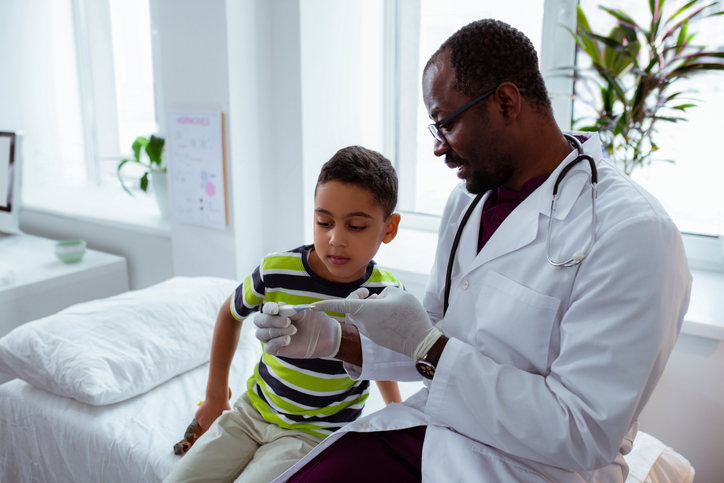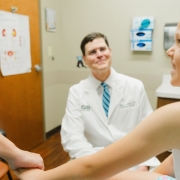COVID-19: How Standing Still Has Kids Going Backwards
By Shannon Suarez, MSN, APRN, CPNP
March 16, 2020, changed a lot for the children of Georgia. For my own three daughters, it was the last day my third-grader would hug her teacher goodbye, and the last day my sixth graders would cram a book into their lockers. But there they were, downright giddy at the thought of an unplanned holiday. Governer Kemp had begun closing schools due to COVID-19 but it wasn’t long before we saw restaurants, businesses, and eventually, the entire country follow. Weeks turned into months and now we find ourselves knocking on the door of the next school year. Time flies when you’re…well…not doing much.
Some counties have announced their commitment to 100% virtual school until further notice. Others are offering both virtual and in-person. Some are still deciding. All options have left some parents relieved about the decisions being made while others are admittedly furious. Alas, it is this sort of heated divide we have come to expect from the year 2020.
It is true that the American Academy of Pediatrics has elevated the importance of face-to-face schooling. We are no doubt seeing the psychological and physiological toll a disruption of this magnitude has taken on our kids. But whether our school systems have the resources to carry out of the Center for Disease Control’s (the CDC) suggested safety guidelines remains unclear. Just recently, our U.S. Surgeon General, Dr. Jerome Adams, appeared on CBC This Morning to report that the biggest determinant to reopening schools is lowering the transmission rate by wearing masks and social distancing, requests that appear to have mixed popularity among Georgians. The only thing that appears certain right now is that the virus that was once rumored to dissolve in the hot summer sun is starting to feel like it’s going to be a fall fixture.
Rambling anecdote aside, as a pediatric urology nurse practitioner, I’m here to discuss some urinary issues that can arise in stressful and uncertain situations like these. Kids have been home for four months. Some of you may already be seeing a regression in previously toilet trained children. According to Sigmund Freud, regression is an unconscious defense mechanism that causes the temporary or long-term reversion of the ego to an earlier stage of development. Regression is typical in normal childhood and it can be caused by stress, frustration, or trauma. Put simply, Freud suggests this coping mechanism is your child trying to display their distress by reverting to behaviors from younger years. This can take the form of temper tantrums, thumb sucking, refusing to sleep in their own bed, and for the purposes of this article, wetting the bed or having daytime urinary accidents.
The first and most important thing to know is that this regression is not intentional. While many adults are facing extremely trying times right now, getting angry and scolding or punishing the child may take you farther from your end goal. The same associated with displeasing you can create even more anxiety around voiding, which can worsen bowel and bladder holding and resultant incontinence. Hiding soiled clothes or bed sheets is not uncommon.
What’s more, these accidents are not limited to urine. Fecal accidents, typically in the form of smearing, can occur as well. This may occur due to regression alone or it can be a sign of constipation. If your child is now home alone during the day, or you’re having to work from home and therefore unable to fully supervise, there’s a chance they’re not eating enough fiber or drinking enough water. Without our usual sports, play dates, and summer camps, they’re also probably not getting the same amount of physical exercise their bodies rely on to move their bowels. In fact, constipation alone can be the source of urinary problems, which you can read more about in my previous article, Here’s the Scoop on Poop.
Any child undergoing regression of any kind needs patience, a little extra attention, and small achievable goals to work towards within a safe space to fail. Purchase protective bed liners, keep a change of clothes in the car, participate in frequent reminders to use the bathroom, and consider using a reward chart to track success. We need to try our best to provide some semblance of routine and reinforce their sense of security by discussing world events at an age-appropriate level. It’s also imperative for parents to try and regulate their own personal stress in healthy ways. After all, they are hearing us, watching us, and mirroring us.
Resolving regression can take weeks. If you’ve selected for your child to attend school in-person, there’s a chance your child will simply feel “back to normal”. However, it is wise to educate them that school may look a little differently than it used to. Fewer students, face masks, discouragement to socialize closely, and new lunch and bathroom policies may give your child a whole new set of changes to adjust to. Open communication with your child’s teacher will be key and you can read more about this in my previous article, Breaking the Barriers on Bathroom Passes.
Now, if you’re going virtual this school year, this presents a unique opportunity to create a strong routine and stick to it long term. Depending on your child’s urinary symptoms. interventions like timed voiding, constipation prevention, a diet free from bladder irritants, and a bedwetting alarm may be helpful in getting your child back on track. While normally we teach parents to build these factors into a child’s school day, completed them at home should ideally remove some of the obstacles one can encounter.
If your child’s urinary symptoms do not improve within a few weeks, consult with your pediatrician or pediatric urology team at Georgia Urology’s Help Awaiting Wet Kids (HAWK) Clinic for further evaluation. It is also important to note that a new onset of urinary symptoms can also be a sign of other issues, having nothing to do with pandemic life. As always, our providers at Georgia Urology are here to discuss any concerns or answer any questions you might have about your child. Given the COVID-19 pandemic, we have a number of safety measures in place to protect patients and staff in our offices, however, we are also offering telehealth appointments if you prefer not to leave your home during this time.
To make an appointment with Georgia Urology’s pediatric team, schedule online or call one of our office locations.









